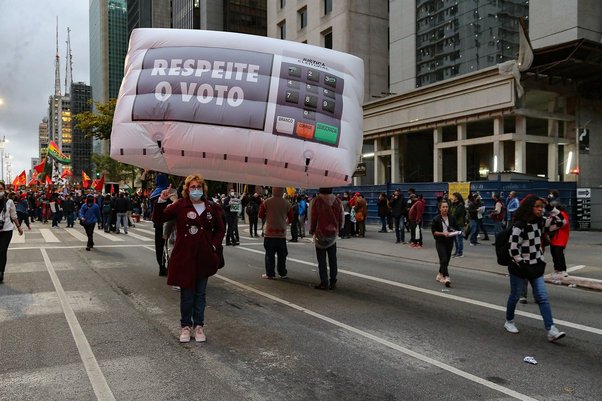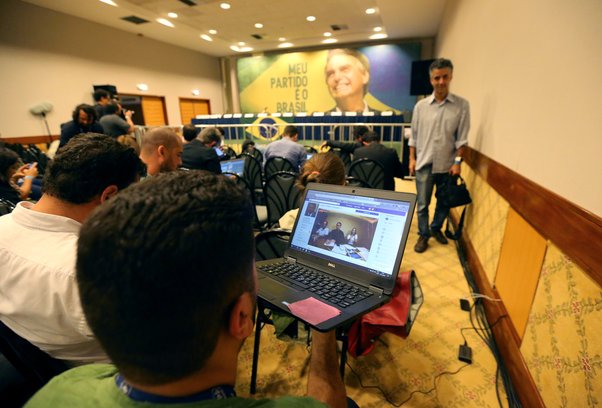Our new investigation shows Facebook failed to detect ads with election-related disinformation ahead of the 2022 Brazilian election. These ads contained false information about the election, promoting the wrong election date and false voting methods, which could prevent people from voting, and called into question the integrity of the election.
We submitted ten Brazilian Portuguese-language ads that contained election disinformation, and alarmingly, 100% of the ads were accepted for publishing by Facebook. All of the ads submitted violate Meta’s election ad policies and community guidelines. Alarmingly, we were able to submit the ads from outside of Brazil and pay for them with a non-Brazilian payment method, with an account that had not been verified by Facebook’s ‘ad authorisation’ process – a requirement for any account posting election-related content.
One ad which was aimed towards Indigenous groups and promoted the wrong election date was initially rejected under Facebook’s “Ads about social issues, elections, or politics” policy. But just six days later, without any intervention from us, the ad was approved without explanation. This bizarre sequence of decisions from Facebook seriously calls into question the integrity of its content moderation systems.
“Facebook knows very well that its platform is used to spread election disinformation and undermine democracy around the world,” said Jon Lloyd, Senior Advisor at Global Witness. “Despite Facebook’s self-proclaimed efforts to tackle disinformation – particularly in high stakes elections – we were appalled to see that they accepted every single election disinformation ad we submitted in Brazil.”
This follows a similar pattern we uncovered in Myanmar, Ethiopia, and Kenya about Facebook’s inability to detect hate speech in volatile political environments – but what’s different this time is the ad content contained incorrect information that could stop people from voting, such as false information about when, where, and how to vote. Importantly, some of the ads also call into question the integrity of Brazil’s electronic voting machines – with messaging mirroring current President Bolsonaro’s narrative of a potential stolen election and setting the stage for contesting the election result.
Election disinformation continues to spread rapidly across Brazil, with some political groups seeking to lay the groundwork for unrest and violence to contest the election, using similar tactics to the “Stop the Steal” disinformation campaign in the 2020 US election.
“The disinformation that Facebook allows on its platform feeds into the ‘stop the steal’ narrative in Brazil – a growing tactic intended to set the stage for contesting the election and risking similar violence as we saw during the January 6th insurrection attempt in the US,” said Lloyd. “Facebook can and must do better. It’s not enough to say they’ve hired thousands of content moderators and have invested in AI detection – when clearly these safeguards are failing. They need to show their work.”
"This investigation shows that Meta prioritizes its profit over the protection of Global South democracies. The company shows its inability to control the use of its platform to spread fake news, and this has a direct negative impact on our democracy", says João Brant, coordinator of Desinformante platform in Brazil.
“This election is the first since Bolsonaro came to power in 2018 and, under Bolsonaro, the world has seen accelerated deforestation in the Amazon and a higher number of environmental defenders murdered than ever before. This election is critical – the people of Brazil and our planet depend on a clean and fair election,” said Lloyd. “Facebook must urgently tackle the disinformation proliferating on its platform to prevent the risk of election interference, disinformation, unrest and violence in Brazil.”
A Meta spokesperson said in response to our findings that they "are and have been deeply committed to protecting election integrity in Brazil and around the world". They said they have prepared extensively for the upcoming election in Brazil including launching tools to label election-related posts and establishing a direct channel for the Superior Electoral Court to send them potentially harmful content for review. They cited figures for the number of posts they removed in the last election for violating their policies [1].
We call on Facebook to:
- Urgently increase its content moderation capabilities and integrity systems – including its account authorisation process – and ensure that the moderators understand the appropriate cultural context and nuance of Brazilian politics
- Allow verified independent third party auditing so that Meta can be held accountable for what they say they are doing.
- Respond to the 90+ Brazilian civil society organisations’ policy recommendations in their report The Role Of Digital Platforms In Protecting Electoral Integrity In The 2022 Brazilian Election.
Notes to editors
[1] The full response from Meta was: “We cannot comment on these findings as we don't have access to the full report. However, we prepared extensively for the 2022 election in Brazil. We’ve launched tools that promote reliable information and label election-related posts, established a direct channel for the Superior Electoral Court to send us potentially-harmful content for review, and continue closely collaborating with Brazilian authorities and researchers. Our efforts in Brazil’s previous election resulted in the removal of 140,000 posts from Facebook and Instagram for violating our election interference policies and 250,000 rejections of unauthorized political ads. We are and have been deeply committed to protecting election integrity in Brazil and around the world.”


